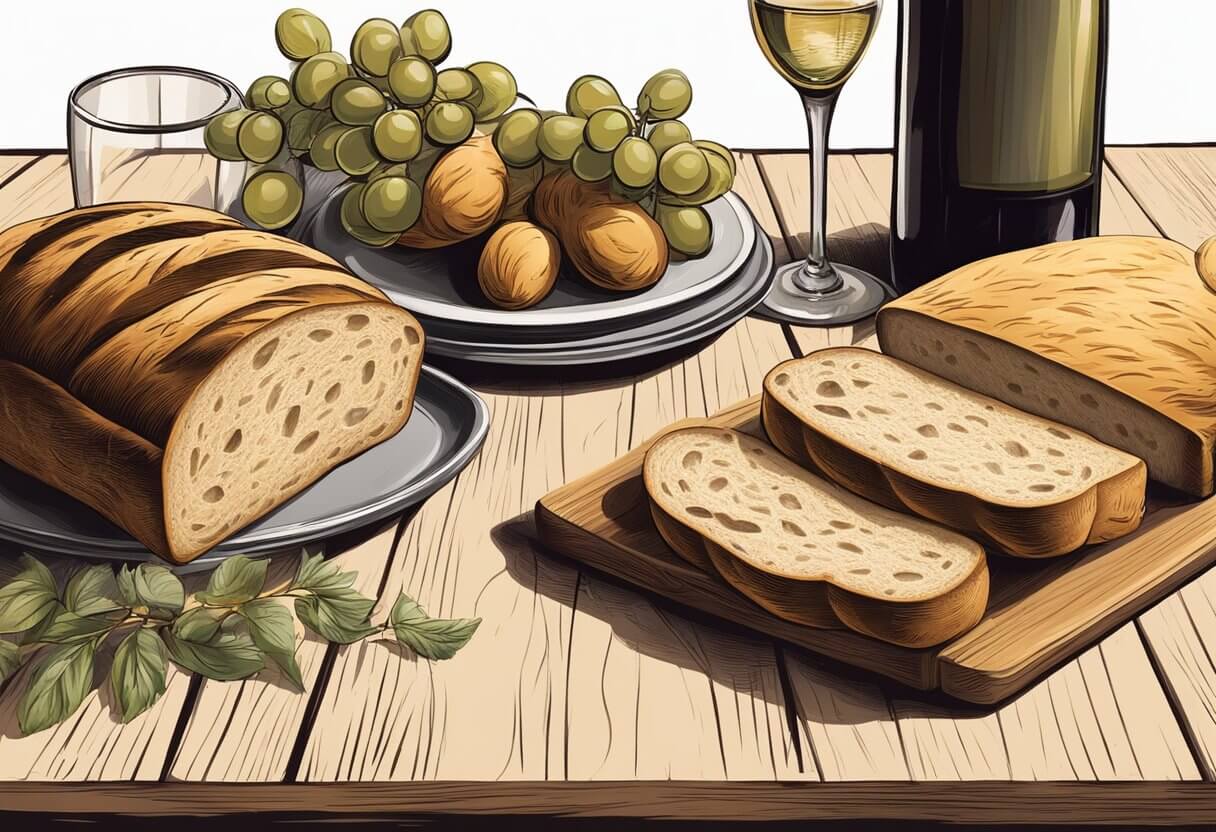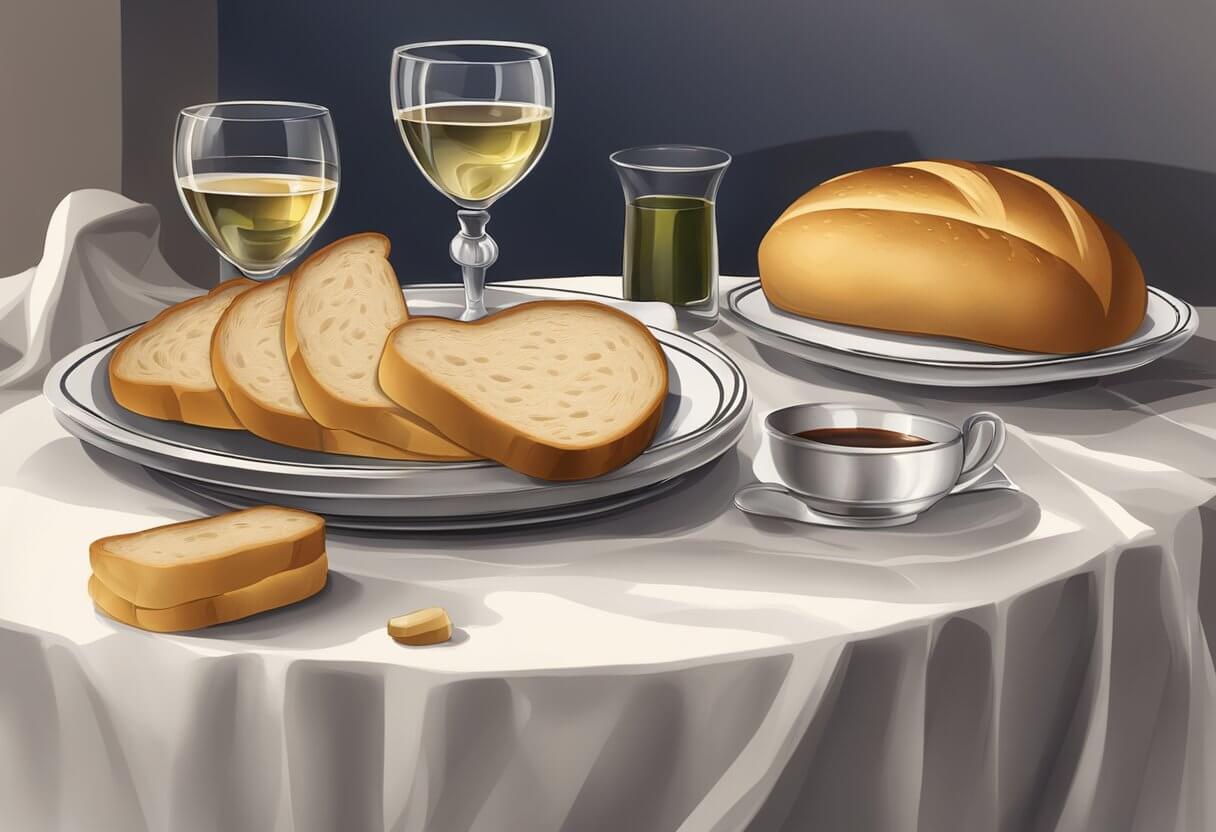Do you want to know the biblical meaning of a table in a dream? If yes, learn the true meaning of this dream.
Dreams have long been a source of fascination and intrigue for people throughout history.
Many people believe that dreams hold deep spiritual significance and can provide insight into one’s life and future.
In particular, the biblical meaning of dreams has been studied and analyzed by scholars and believers alike for centuries. One common dream symbol that appears in the Bible is the table.

In the Bible, tables are often used to represent the gathering of people for a meal or celebration.
The act of sharing a meal together is seen as a symbol of fellowship, community, and unity.
In dreams, a table can represent these same themes, as well as the idea of abundance and provision.
Dreaming of a table may be a sign of spiritual nourishment and sustenance, as well as a reminder to trust in God’s faithfulness to provide for one’s needs.
13 Biblical Meanings of a Table in a Dream
Dreams have always been a mysterious and fascinating subject. In the Bible, dreams are often used as a means of divine communication.
The symbolism of a table in a dream is rich and meaningful. Here are 13 biblical meanings of a table in a dream:
Fellowship:
A table in a dream can represent a gathering of people, symbolizing fellowship, and community.
Provision:Tables are where food is served, and in the Bible, food often represents provision. A table in a dream can signify that God is providing for the dreamer’s needs.
Communion:
In the Bible, the Last Supper was a meal shared by Jesus and his disciples. A table in a dream can represent the idea of communion with God and others.
Unity:
Tables are often used as a symbol of unity, as they bring people together to share a meal or conversation.
Abundance:
A table full of food can represent abundance and blessings from God.
Celebration:
Tables are often used in celebrations, such as weddings or feasts. A table in a dream can represent a time of joy and celebration.
Hospitality:
Tables are where guests are welcomed and served. A table in a dream can represent the dreamer’s desire to be hospitable and welcoming to others.
Sacrifice:
In the Bible, tables were often used for sacrifices and offerings. A table in a dream can represent the idea of sacrifice and giving to God.
Preparation:
Tables are where food is prepared and served. A table in a dream can represent the idea of preparation for a task or event.
Honor:
In the Bible, tables were often used to honor guests and show respect. A table in a dream can represent the dreamer’s desire to show honor and respect to others.
Wisdom:
In the book of Proverbs, wisdom is personified as a woman who prepares a feast and invites people to her table. A table in a dream can represent the idea of seeking wisdom and knowledge.
Protection:
In the Bible, tables were sometimes used as a place of refuge and protection. A table in a dream can represent the idea of finding safety and security in God.
Guidance:
In the Bible, tables were sometimes used as a place of instruction and guidance. A table in a dream can represent the dreamer’s desire for guidance and direction from God.
It is interesting to read the biblical meaning of birds in dreams.
Dreams in the Old Testament

Dreams played a significant role in the Old Testament, with many biblical figures receiving divine messages through their dreams.
For example, in Genesis 15:1, Abram received a vision from God that promised him protection and a great reward.
Similarly, in Genesis 28:12, Jacob had a dream in which he saw a ladder reaching up to heaven, with angels ascending and descending on it.
God spoke to him in the dream, promising to bless him and his descendants.
In other instances, dreams were used to convey warnings or instructions. For example, in Genesis 41, Pharaoh had a dream that he could not interpret, and Joseph was called upon to interpret it for him.
The dream predicted seven years of abundance followed by seven years of famine, and Joseph advised Pharaoh to store up food during the years of plenty to prepare for the lean years ahead.
Throughout the Old Testament, dreams were seen as a way for God to communicate with his people.
They were often used to reveal important information or to guide individuals in their actions.
As such, dreams were highly valued and respected, and those who received them were often seen as having a special connection to God.
In the context of the biblical meaning of a table in a dream, dreams in the Old Testament serve as a reminder that tables were often associated with divine messages and guidance.
Just as God used dreams to communicate with his people in the Old Testament, a table in a dream may represent the wisdom and understanding that God imparts to those who seek him.
Before you leave, also read the biblical meaning of death in a dream.
Dreams in the New Testament

Dreams play a significant role in the New Testament, particularly in the early years of Jesus Christ’s life.
According to the Gospel of Matthew, an angel appeared to Joseph in a dream, informing him that Mary was pregnant through the Holy Spirit and instructing him to take Mary as his wife and name the child Jesus (Matthew 1:20-21).
Similarly, the Magi were warned in a dream not to return to Herod and instead to go back to their own country by another route (Matthew 2:12).
In another instance, Joseph was warned in a dream to flee to Egypt with Mary and Jesus to avoid Herod’s wrath (Matthew 2:13).
Later, after Herod’s death, Joseph was again instructed in a dream to return to Israel with his family (Matthew 2:19-20).
In the book of Acts, dreams are also mentioned as a means of divine communication. In Acts 16:9-10, Paul receives a vision in a dream that leads him to Macedonia, where he preaches the gospel and establishes a church.
Additionally, in Acts 2:17, Peter quotes the prophet Joel, saying that in the last days, God will pour out His Spirit upon all people and that they will prophesy, see visions, and dream dreams.
Overall, dreams in the New Testament serve as a means of divine communication, providing guidance and direction to those who are open to receiving them.
They reinforce the idea that God is actively involved in the lives of His people and that He communicates with them in various ways, including through dreams and visions.
Table in Biblical Events and Narratives

Tables play a significant role in the Bible, appearing in numerous events and narratives. Here are some of the most notable mentions of tables in the Bible:
Last Supper
The Last Supper is one of the most famous biblical events involving a table. It was during this meal that Jesus shared bread and wine with his disciples, signifying his impending sacrifice on the cross.
The Last Supper has since become a symbol of sacrifice, faithfulness, and communion with God.
Passover
The Passover meal is another significant event in the Bible that involves a table. During the Passover, the Israelites would gather around a table to commemorate their liberation from slavery in Egypt.
The Passover has become a symbol of freedom, faith, and God’s faithfulness to his people.
Psalm 23:5
In Psalm 23:5, the psalmist speaks of a table being prepared for him in the presence of his enemies. This table represents God’s provision and protection, even in the midst of adversity. It is a symbol of hope and trust in God’s faithfulness.
Abraham and the Israelites
Tables are also mentioned in the stories of Abraham and the Israelites. In Genesis 18, Abraham prepares a meal for three visitors who turn out to be angels.
This meal is served on a table and represents Abraham’s hospitality and faithfulness to God.
In Exodus 25, God instructs Moses to build a table for the Ark of the Covenant, which would hold the Ten Commandments. This table represents God’s presence and faithfulness to his people.
Joseph in Egypt
In Genesis 43, Joseph prepares a feast for his brothers and serves them at a table. This meal represents Joseph’s forgiveness and reconciliation with his brothers, as well as God’s faithfulness to his promises.
It is a symbol of the power of forgiveness and the importance of unity and reconciliation.
In conclusion, tables play a significant role in the Bible and are often used as symbols of faith, sacrifice, provision, and reconciliation.
Whether in the Old Testament or the New Testament, tables are a reminder of God’s faithfulness to his people and the importance of unity and communion with one another.
Final Words
In summary, the biblical meaning of a table in a dream can vary depending on the context and symbolism used in the dream.
Tables can represent fellowship, community, knowledge, and learning, and they may carry profound messages from the divine.
Some believers interpret a dream of a table as a reminder of the importance of relationships and the need for social interaction. Others may see it as a sign of confidence or arrogance, depending on the dream’s details.
Regardless of the interpretation, it is important to approach dream analysis with an open mind and seek guidance from trusted sources.
Dreams can offer insight into one’s subconscious thoughts and emotions, and understanding their symbolism can provide clarity and guidance in waking life.
It is also essential to remember that dream interpretation is not an exact science and can vary based on personal beliefs and experiences.
Therefore, it is crucial to approach dream analysis with caution and seek guidance from trusted sources.
Overall, understanding the biblical meaning of a table in a dream can provide insight into one’s spiritual journey and offer guidance on relationships, knowledge, and community.